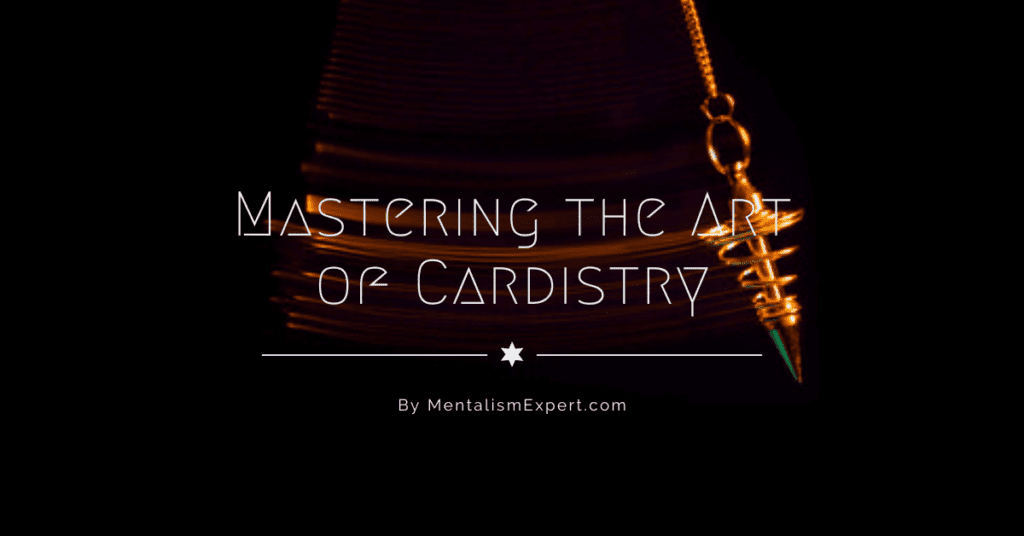Mentalism is a type of entertainment that involves the performer demonstrating seemingly psychic abilities, such as telepathy, clairvoyance, and mind control. Mentalists often use a variety of techniques to create the illusion of these abilities, including psychology, suggestion, and sleight of hand.
One common technique used by mentalists is cold reading, which involves the performer gathering information about the audience member and using that information to create the illusion of psychic ability. For example, a mentalist may ask leading questions or make generalizations about the audience member’s appearance or behavior and then use their responses to make seemingly accurate predictions or observations. Mentalists may also use misdirection and suggestion to influence the audience’s perception of events and create the impression of psychic abilities.
Key Takeaways
- Mentalism is a form of entertainment that involves the performer demonstrating seemingly psychic abilities, such as telepathy, clairvoyance, and mind control.
- Mentalists use a variety of techniques, including psychology, suggestion, and sleight of hand, to create the illusion of psychic ability and entertain audiences.
- If you are interested in becoming a mentalist, it is important to learn about the history and principles of mentalism, practice regularly, study psychology and persuasion techniques, develop your stage presence, and seek out mentorship or guidance from experienced mentalists.
- Mentalism is a challenging but rewarding field, and with dedication and practice, anyone can learn the skills needed to become a mentalist.
- It is important to remember that mentalism is a form of entertainment and does not involve genuine psychic abilities.
What Is Mentalism?
Mentalism is a type of entertainment that involves the performer demonstrating seemingly psychic abilities, such as telepathy, clairvoyance, and mind control. Mentalists often use a variety of techniques to create the illusion of these abilities, including psychology, suggestion, and sleight of hand.
So, what is a mentalist and how does a mentalist work? Mentalism is not a form of psychic ability or supernatural power, and mentalists do not actually possess psychic powers. Instead, they use a variety of techniques to create the illusion of psychic ability and entertain audiences with their ability to seemingly read minds, predict the future, and influence behavior. Mentalism has a long history, with roots dating back to ancient civilizations, and it has been a popular form of entertainment for many years.
The History of Mentalism
The history of mentalism can be traced back to ancient civilizations, where it was often associated with spiritual or religious practices. Mentalism as a form of entertainment, however, has a more recent history. In the 19th century, performers known as “mind readers” or “thought readers” began to emerge, using a variety of techniques to create the impression of psychic ability. These performers were popular in Europe and the United States, and many of their techniques and principles are still used by modern mentalists.
In the 20th century, mentalism continued to evolve and gain popularity. Many well-known famous mentalists emerged during this time, including The Amazing Kreskin, Uri Geller, and Derren Brown. Mentalism has also been featured in many television shows, books, and movies, and it remains a popular form of entertainment to this day.
But How Do Mentalists Trick the Mind?
I bet you wondering how mentalists do it. Well, mentalists use a variety of techniques to create the illusion of psychic ability and trick the mind. These techniques can include:
Cold reading
This involves the mentalist gathering information about the audience member and using that information to create the illusion of psychic ability. The mentalist may ask leading questions or make generalizations about the audience member’s appearance or behavior and then use their responses to make seemingly accurate predictions or observations.
Misdirection and suggestion
Mentalists may use misdirection in magic to distract the audience’s attention and create the impression of psychic ability. They may also use suggestion to influence the audience’s perception of events and create the impression of psychic powers.
Sleight of hand
Mentalists may use tricks such as palming or switching objects to create the illusion of psychic ability.
Psychology
Mentalists may use psychological principles, such as the Forer effect (the tendency for people to rate vague and general statements as highly accurate) and the Barnum effect (the tendency for people to believe in generalities about themselves), to create the impression of psychic ability.
Special props
Mentalists may use props, such as sealed envelopes or hidden compartments, to create the impression of psychic ability.
Overall, mentalists use a combination of these techniques to create the illusion of psychic ability and trick the mind. It is important to remember that mentalism is a form of entertainment and not a genuine psychic ability.
5 Mentalism Magic Tricks You Can Try
Here are five mentalism magic tricks that anyone can try at home:
The “which hand” trick
This trick involves hiding an object (such as a coin or a piece of candy) in one of your hands and asking someone to guess which hand it is in. To perform the trick, you can use misdirection and suggestion to influence the person’s decision.
The “card guess” trick
This trick involves asking someone to think of a card from a deck and then guessing which card they are thinking of. To perform the trick, you can use psychology and the Forer effect (the tendency for people to rate vague and general statements as highly accurate) to make seemingly accurate guesses.
The “telepathy” trick
This trick involves pretending to read someone’s mind and revealing a word or phrase that they were thinking of. To perform the trick, you can use psychology, suggestion, and misdirection to influence the person’s thoughts and create the impression of telepathy.
The “prediction” trick
This trick involves making a prediction about something that will happen in the future (such as the outcome of a coin flip) and then having the prediction come true. To perform the trick, you can use sleight of hand or special props (such as sealed envelopes) to secretly control the outcome.
The “mind control” trick
This trick involves pretending to control someone’s thoughts or actions. To perform the trick, you can use suggestion, misdirection, and psychology to influence the person’s behavior and create theimpression of mind control.
Remember, these mind-reading tricks are meant for entertainment purposes only and do not involve genuine psychic abilities.
5 Useful Tips On How To Become A Mentalist
Here are five useful tips on how to become a mentalist:
1. Learn About The History And Principles Of Mentalism
For you to learn how to become a mentalist, it is important to understand the history and principles of mentalism, as well as the various techniques that are used to create the illusion of psychic ability. This can help you develop your own style and approach to mentalism.
2. Practice Regularly
Becoming a mentalist requires a lot of practice and repetition. Practice different techniques and tricks, and try to perform them in front of an audience (even if it is just a small group of friends or family). This will help you become more comfortable and confident in your abilities.
3. Learn Psychology And Persuasion Techniques
Mentalists often use psychological principles and persuasion techniques to influence the thoughts and behavior of their audience. Studying these
subjects can be helpful in developing your mentalism skills. Try reading books on mentalism to help you get a better understanding.
4. Develop Your Stage Presence
As a mentalist, you will be performing in front of an audience. Developing a strong stage presence and engaging with your audience is essential for a successful performance.
5. Learn From Experienced Mentalists
There are many experienced mentalists who are willing to share their knowledge and experience. Consider seeking out mentorship or taking classes from experienced mentalists to learn more about the craft.
Conclusion
In conclusion, mentalism is a form of entertainment that involves the performer demonstrating seemingly psychic abilities, such as telepathy, clairvoyance, and mind control. Mentalists use a variety of techniques, including psychology, suggestion, and sleight of hand, to create the illusion of psychic ability and entertain audiences.
If you are interested in becoming a mentalist, it is important to learn about the history and principles of mentalism, practice regularly, study psychology and persuasion techniques, develop your stage presence, and seek out mentorship or guidance from experienced mentalists. Mentalism is a challenging but rewarding field, and with dedication and practice, anyone can learn the skills needed to become a mentalist.
FAQ
Can mentalism be learned?
Yes, mentalism can be learned by anyone who is interested in the field. Mentalism is a form of entertainment that involves the performer demonstrating seemingly psychic abilities, such as telepathy, clairvoyance, and mind control. Mentalists use a variety of techniques, including psychology, suggestion, and sleight of hand, to create the illusion of psychic ability and entertain audiences. With dedication and practice, anyone can learn the skills needed to become a mentalist.
How long does it take to become a mentalist?
The amount of time it takes to become a mentalist can vary depending on a number of factors, including your natural ability, the amount of time you are able to dedicate to practice, and your access to resources and mentorship.
Some people may be able to learn the basic principles and techniques of mentalism relatively quickly, while others may take longer to develop their skills. It is important to remember that becoming a mentalist requires a lot of practice and repetition, and it may take some time before you feel confident and comfortable performing in front of an audience.
Can we learn mentalism from books?
Yes, it is possible to learn mentalism from books. There are many books available on the subject of mentalism that can provide information on the history, principles, and techniques used in mentalism. Reading books on mentalism can be a helpful way to learn about the field and gain a deeper understanding of the various techniques that are used to create the illusion of psychic ability. However, it is important to keep in mind that reading about mentalism is not a substitute for hands-on practice and repetition.
To truly become proficient in mentalism, it is necessary to actively practice the techniques and tricks and seek out mentorship or guidance from experienced mentalists.
Can I learn mentalism online?
Yes, it is possible to learn mentalism online through a variety of resources, including online courses, videos, and tutorials. There are many websites and platforms that offer mentalism training, often taught by experienced mentalists. These resources can be a convenient and flexible way to learn about mentalism and gain access to a wide range of techniques and tips. However, it is important to keep in mind that learning mentalism online is not a substitute for hands-on practice and repetition. To truly become proficient in mentalism, it is necessary to actively practice the techniques and tricks and seek out mentorship or guidance from experienced mentalists.
Who is the best mentalist in the world?
It is difficult to determine who the best mentalist in the world is, as mentalism is a subjective field, and different people may have different opinions on what makes a mentalist the best. There are many talented and skilled mentalists in the world, and it is up to individual audiences and critics to decide which mentalists they consider to be the best. Some well-known and highly regarded mentalists include The Amazing Kreskin, Uri Geller, and Derren Brown.








